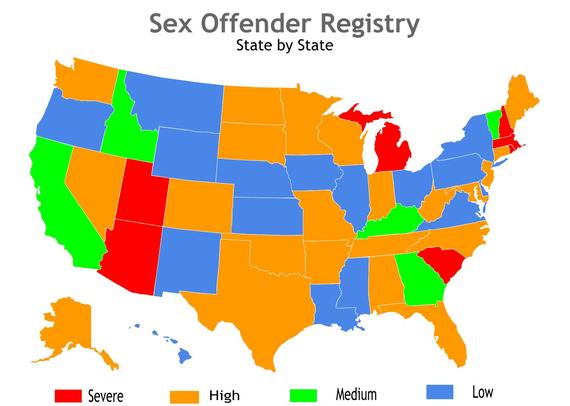This summer, 19-year-old Zachary Anderson was featured on the front page of the New York Times. Unfortunately, Anderson became a national figure after he was placed onto the sex offender registry -- for making a simple mistake. Zachary had consensual sex with a 14-year-old girl, but she had led him to believe she was actually 17. When everyone realized this situation, Anderson turned himself in and served a 90-day jail sentence.
In September, The Atlantic reported on yet another story of a young person threatened with the registry. A 17-year-old in North Carolina is facing five counts of sexual exploitation of a minor, after he texted sexually explicit images to his 17-year-old girlfriend. Though their consensual sex is legal, it's illegal for anyone under 18 to send or receive explicit photos with a cellphone.
As these instance show, simple mistakes can end up doing irrevocable damage to the lives of young people. According to ReformSexOffenderLaws.Org, these stories are all too common. Of the 800,000 sex offenders in the U.S., approximately 200,000 of them were added to the registry as minors.
Though Anderson is out of jail, he will face onerous restrictions as a sex offender. For example, Zachary was majoring in computer science at college, but he's now barred from using computers for the next five years. Anderson will always wonder if he's too close to a school or playground. He will always have to worry about finding a job. He will wonder if he, too, will become another one of the thousands of homeless sex offenders in this country.
Besides just being an inconvenience, the public shaming of the registry also puts people's lives in danger. NPR News explains that sex offender Frank Lindsay came home one day to find a neighbor threatening to beat him to death with a hammer, because the neighbor used California's public registry to find the sex offender in his area. And CNN reports that in 2013 Jeremy Moody and his wife Christine turned the South Carolina sex offender registry into a hit list, where the couple picked offenders at random and murdered them. These examples are only a few of many, of how a public registry intended to make our communities more safe -- is only making more victims.
In her 2015 book Protecting Our Kids? How Sex Offender Laws Are Failing Us, criminologist Emily Horowitz argues that our draconian sex offender laws "promote fear, destroy lives, and fail to protect children." With all of these stories circulating in the news, though, I've been wondering -- what's the best way to reform the sex offender registry?
Well, part of the difficulty in reforming sex offender laws, is that registry is completely different from state to state. So in order to change our laws, we need to know specifically the differences of each version. I made the graphic below which synthesizes some of that information, and the color code indicates the severity level of the sex offender laws in the state: red being the most severe, with blue being the least.
The red states are "Severe" because they have laws about consensual among teenagers, and public urination. The orange states just have laws about consensual sex among teenagers, and the green have public urination laws. The blue states laws might not have explicit laws about either. Something this graphic doesn't take into account -- the length of time that people are registered for. Some states have lifetime registrations, while others have ways to get off the registry. Also, all of the state have to deal with making their registries non-public, so that vigilantes cannot murder anymore offenders.
On my blog, I have a guide on how to write a letter to your state representative. Regardless of where you live, inform your legislator of the harm that these registries cause.
You might think, why do I care? Well, I am on the Wayne State University Forensics speech team. For my persuasive speech, I'm advocating to, you guessed it, reform the sex offender registry. In doing the research for my speech, and this article, I've been amazed at the horrible way our society treats the modern day pariah - the sex offender.
The unmistakable tragedy of children and adults alike being the victims of sexual violence, brought the sex offender registry into being. Unfortunately, this long relied upon tool is an out of control source of abuse of the thousands registered. But by taking steps to address this problem, like going to ReformSexOffenderLaws.Org, or writing that letter, we can hopefully guarantee that no citizen is forever an outcast.

